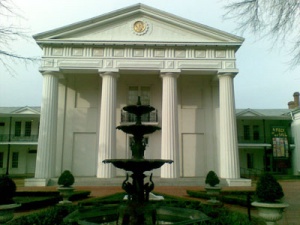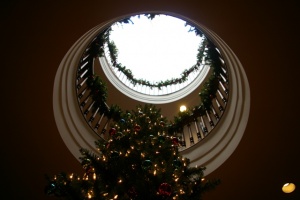Difference between revisions of "Old State Capitol"
| Line 1: | Line 1: | ||
[[Image:Old-state-house-2.jpg|thumb|300px|Steps of the Old State House. Photo by Phil Frana.]] | [[Image:Old-state-house-2.jpg|thumb|300px|Steps of the Old State House. Photo by Phil Frana.]] | ||
[[Image:Old-state-tree.JPG|thumb|300px|Interior of Old State House. Photo by Victor Frana.]] | [[Image:Old-state-tree.JPG|thumb|300px|Interior of Old State House. Photo by Victor Frana.]] | ||
| − | [[Image:Old-state-assembly.JPG]|thumb|300px|Restored legislative chamber at Old State House. Photo by Victor Frana.] | + | [[Image:Old-state-assembly.JPG]|thumb|300px|Restored legislative chamber at Old State House. Photo by Victor Frana.]] |
'''The Old State Capitol''', or Old State House, is the oldest surviving state capitol west of the Mississippi River. It became the official seat of government in 1836 when Arkansas was admitted as the 25th state, although the building was not complete. Much of the construction process was performed by slaves, such as the making of bricks. The building was completed in 1842. | '''The Old State Capitol''', or Old State House, is the oldest surviving state capitol west of the Mississippi River. It became the official seat of government in 1836 when Arkansas was admitted as the 25th state, although the building was not complete. Much of the construction process was performed by slaves, such as the making of bricks. The building was completed in 1842. | ||
Revision as of 12:35, 3 January 2010
[[Image:Old-state-assembly.JPG]|thumb|300px|Restored legislative chamber at Old State House. Photo by Victor Frana.]] The Old State Capitol, or Old State House, is the oldest surviving state capitol west of the Mississippi River. It became the official seat of government in 1836 when Arkansas was admitted as the 25th state, although the building was not complete. Much of the construction process was performed by slaves, such as the making of bricks. The building was completed in 1842.
The building is located approximately one mile east of the present state capitol, which became the new seat of government in 1911. The Old State House was used for a variety of purposes after the capitol was moved, such as a memorial site and a meeting place for political groups. In 1941, it became a museum by an act of legislature and remains so until this day.
The Old State House is a notable site in relation to William Jefferson (Bill) Clinton as it was the location of his 1992 and 1996 election-night celebrations.
The Old State Capital building is now part of the Old State House and Historic Arkansas Museum.

